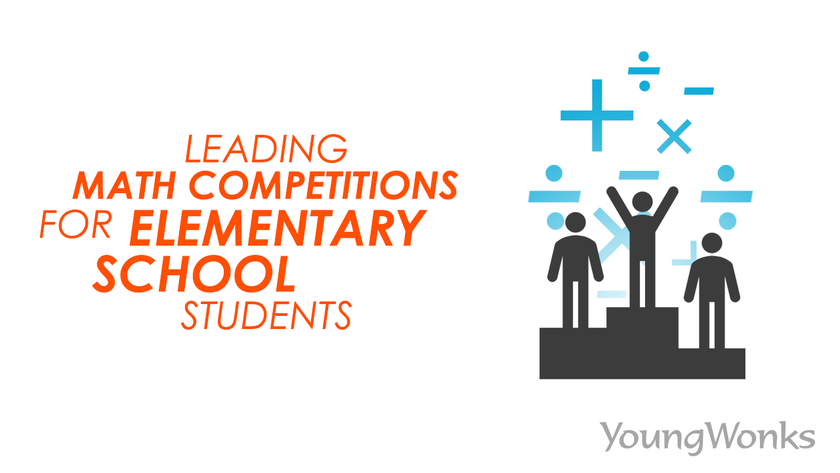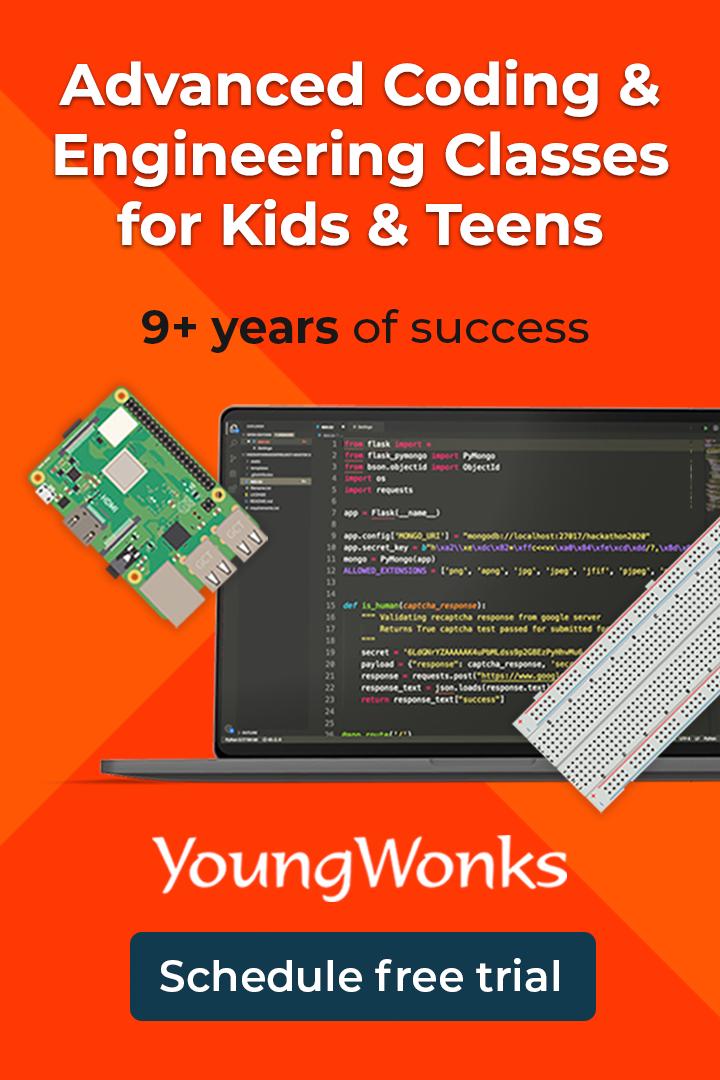Oct 03, 2018 By Team YoungWonks *
Math competitions for America’s elementary school students are aimed at imbibing among these students an early love for the subject. And while math contests for middle and high school students across the US are quite well-known, not many are aware of the leading math contests for elementary school students in the US. It is important to emphasize here that starting out at the elementary school level (kindergarten to grades 5-6) is ideal for budding enthusiasts who hope to make a mark in the higher level competitions. So which are the biggest math competitions for elementary school students in the US? Read on to know more:
- Perennial Math National Championships: Created by math specialist Dr. Sylvia Dean to provide students more platforms to display their talents and to help teachers develop math skills in their classroom, Perennial Math hosts online competitions, live on-site tournaments and WebEx virtual tournaments for students in grades 3-12. The Perennial Math National Championships then are open to students and teams who have won at their onsite-tournaments; so any medalist is eligible to enter. These tournaments take place virtually and need a webcam to participate in the video conference along with another device to log in to their live scoring. The competition takes place on a specific day for each grade level usually in the month of May; last year (2019), it was held on a specific day for each grade level during the week of May 11-18, 2019. The individual winners compete in the morning sessions and the team competitions occur in the afternoon. Students have to register latest by the week before the competition; winning students gets certificates, medals and/ or plaques.
For more details, visit: https://perennialmath.com/national-championships - The Continental Mathematics League (CML): CML hosts contests for students in grades 2 through 12. Founded in the year 1980, CML aims at helping students improve their problem solving skills. Schools can enter their students in the contests/ meets as part of teams. Students in grades 2 and 3 can enter three meets in a year (six questions per meet) and the cut-offs for the meets are as follows: February 3, 2020 for Meet 1; March 2, 2020 for Meet 2; April 3, 2020 for Meet 3. On the other hand, students in grades 4, 5 and 6 (upto 9) have five Pythagorean or Euclidean Division meets in a year (again six questions per meet). The cut-offs for these meets are as mentioned: December 2, 2019 for Meet 1; January 6, 2020 for Meet 2; February 3, 2020 for Meet 3; March 2, 2020 for Meet 4; April 3, 2020 for Meet 5. Students will be participating with other students on the same grade level from schools all over the United States. National and regional awards comprise certificates and medals.
For more details, visit: https://www.cmleague.com - K-12 Game-a-thon: The national K-12 Game-a-thon encourages students from pre-kindergarten to grade 12 (elementary students from pre-kindergarten to second grade and third through fifth grade have to form separate teams) to think critically and creatively to design a game that in turn solves a mathematical problem. One or more students, along with a teacher or parent as a coordinator, can invent card games, board games, apps, outdoor games or anything else. The first step involves designing and creating a math game. It could be a card game, a traditional board game, an outdoor game or a computer/ mobile game, but it needs to have a math focus, which means it has to incorporate topics such as algebra, geometry, ratios, statistics and probability, modeling, etc. The second step is where the participants shoot a video of the game with a description and then share the video on YouTube. The last step is where the video is formally submitted as an entry in the competition; last year (2019), the applications had to be sent between February 15 and June 30, 2019 (2020 dates yet to be announced). Entries are evaluated on the basis of the use of math themes, creativity, originality and video presentation; eligible submissions are shared publicly and each participant receives a certificate of participation.
For more details, visit: https://www.mindresearch.org/gameathon - The Noetic Learning Math Contest (NLMC): NLMC is a semiannual problem-solving contest for elementary and middle school students. It is aimed at helping students develop an interest in math and thus hone their problem solving skills. During the contest, students in grades 2-8 are given 45 minutes to solve 20 problems. Teachers in any public school or private school can register their students. For academic year 2019-2020, the contest dates are November 14 - 27, 2019 and April 9 - 23, 2020; regular and late registration deadlines for the latter are March 20 and April 2, 2020 respectively. Top scoring individuals and teams shall be awarded medals and/ or plaques.
For more details, visit: https://www.noetic-learning.com/mathcontest/registration.jsp - Math Bee: Organised by the North South Foundation (NSF), NSF Math Bee is a US-wide competition for the children of Indian American community. Launched in the year 2004, its goal is to better prepare children to take standardized tests such as PLUS, PSAT, SAT I, SAT II and ACT. The competition is open to students from grades 1 to 8. The contests are conducted every year in two steps. Students initially participate in a regional contest, typically conducted during March-April in various states throughout the US. Winners of these regional contests are then invited to participate in the National Finals. The 1st, 2nd, and 3rd place winners from each contest at the Nationals are awarded scholarships that can be redeemed in their freshman year of college. The competition is held across three levels, two of which are for elementary school students; so while MB1 (Math Bee Level 1) is for Grades 1 and 2, MB2 (Math Bee Level 2) is for Grades 3, 4 and 5.
For more details, visit: https://www.northsouth.org/public/USContests/Finals/math - Math Olympiads for Elementary and Middle Schools (MOEMS): MOEMS is a worldwide math competition, organized by a not-for-profit foundation of the same name. It is held each year from November through March with one test scheduled each month. Tests are held at individual schools across the US and results are sent to MOEMS for scoring. Home schools and institutions too can take part in the contest; additionally, two dozen other nations participate in the competition making it one of the most popular math competitions in the world. There are two divisions to the contest: elementary and middle school. Elementary level problems are for grades 4-6 while middle school level problems are for grades 7-8. Winners get plaques and certificates.
For more details, visit: https://www.moems.org/ - Math Kangaroo: Mathematical Kangaroo, also known as International Mathematical Kangaroo, is an international mathematical competition with over 50 participating countries. It is the largest competition for school students in the world, with over 5 million participants from 47 countries in 2009, and 6 million in the year 2014. There are twelve levels of participation, for each grade from 1 to 12. The competition, held annually on the third Thursday of March (this year it's on March 19, 2020), aims at testing not just knowledge of mathematical formulas but also logic. The competition comprises a multiple-choice test to be attempted within 75 minutes. There are 24 questions for students up to 4th grade, and 30 questions for students of the remaining grades. Evaluation of test scores and handing out prizes is done nationally. For more details, visit: http://www.mathkangaroo.us/
- Math League: Founded in 1977 by two high school mathematics teachers, Steven R. Conrad and Daniel Flegler, Math League is a math competition for elementary, middle, and high school students in the United States, Canada, and other countries. It aims to offer students the opportunity to participate in an academically-oriented activity and thus gain recognition for mathematical achievements. For fourth and fifth grade students, registrations are open till January 31, 2020 and the competition is slated to take place on April 15, 2020 or later. For grade 6 students, registrations closed on December 31, 2019 and the contest is scheduled to take place on the third or fourth Tuesday of February (i.e. February 18 or February 25, 2020). Participants have to have a score of 24 or higher on the Math League’s previous or current contests for grade 4 or 5 at the regional level (where students solve in 30 minutes 30 multiple-choice questions on arithmetic and basic principles). Highest scoring students receive certificates of achievement for each grade level.
For more details, visit: http://mathleague.com/ - RSM Foundation International Math Contest: The RSM Foundation’s International Math Contest (IMC) has been created by a team of math education professionals at the Russian School of Mathematics which aims at promoting STEM among K-12 students. The first round of the IMC is free and held online; registrations opened on January 01, 2020. It dwells on problems culled from leading math textbooks around the world, giving parents valuable insights into their ward’s hold over major mathematical concepts. The Final Round of the IMC, in keeping with traditional mathematical Olympiads, features challenging non-routine problems that promote a deeper level of thinking. The Final Round is typically held in February at select RSM locations across the US. The contest is open to all students from grades 3 through 8; top scoring students are awarded gold, silver and bronze medals.
For more information please visit: https://rsmfoundation.org/math-contest/
Boosting Mathematical Brilliance Through Coding
In the realm of academia, mathematics competitions for elementary school students offer a unique platform to showcase problem-solving skills and logical reasoning. At YoungWonks, we believe that the principles underlying these competitions are harmoniously aligned with the skills taught in our Coding Classes for Kids. Specifically, our Python Coding Classes for Kids not only imbue students with an understanding of programming logic but also enhance their mathematical thinking, enabling them to tackle complex problems with ease. Furthermore, our Raspberry Pi, Arduino, and Game Development Coding Classes introduce students to practical applications of mathematics in technology, fostering a deeper appreciation and understanding of both fields. This integrated approach not only prepares students for success in math competitions but also equips them with essential skills for the digital age.
*Contributors: Written by Vidya Prabhu; Illustration by Leonel Cruz

